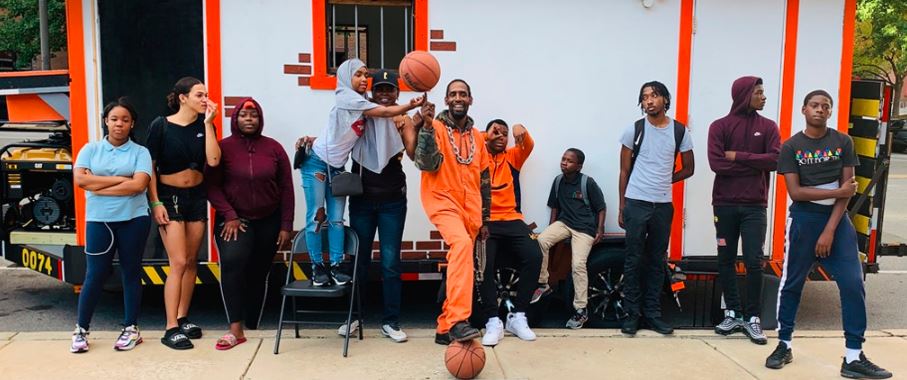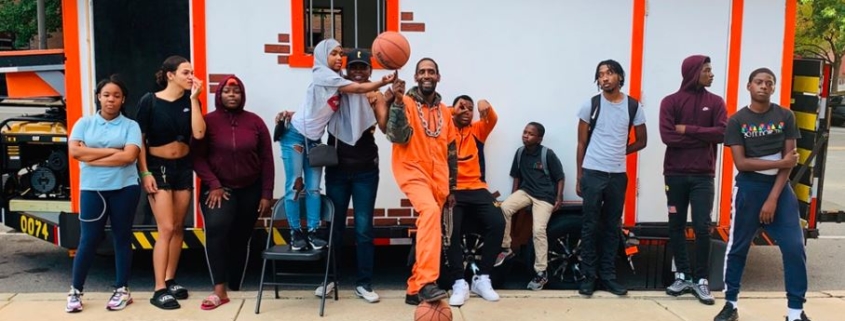Institute for the Development of African American Youth (IDAAY)

The good fight
Archye Leacock was a professor of political science at Temple University in Philadelphia when he first came up with the idea for the Institute for the Development of African American Youth (IDAAY).
The native Trinidadian, who also earned his PhD at Temple, was dismayed by the low number of at-risk youth in his classroom—youth who, in his opinion, were being neglected by the system. When he looked a little further, he realized his students weren’t isolated cases. The local communities surrounding the university campus were full of kids who were doing what they needed to survive in the city’s rough neighborhoods—and suffering as a result.
Archye wanted to show kids another path, so he started an SAT prep course on the weekends in his spare time.
“We were responding to the needs of young people and their parents who weren’t getting the proper support. They needed to learn how to read and do math,” he says. “So I decided to serve these young people and educate them—and their parents too.”
In 1991, IDAAY was officially born and, over the years, it’s grown tremendously to include innovative new programs. The Intensive In-Home Supervision Program, for instance, works with young people who have been arrested and teaches them how to avoid negative repeat behaviors. Young Fathers United offers workshops to help young men learn about their family history, family trends, basic health and childcare. And, of course, there’s the Main College-Bound Program which helps prepare youth, between the ages of 10-18, for college.
“Many young people believe that the only way to survive in the ‘hood is to be ‘strapped’ (or carry a gun). We focus on teaching them different ways.”
~ Archye Leacock, Executive Director, IDAAY
Cash crunched
Not only is the work “heavy”, according to Archye—two local youth were recently shot at the time of writing, and others are sitting on death row—but it’s often made more difficult due to lack of cash. While the organization is funded by city and state grants, including contracts through Health and Human Services of the City of Philadelphia, timely payment is a challenge.
“When you get a contract, you only invoice at the end of month and then you aren’t paid for another 90 days. So, it typically takes four months after we’ve performed a service before we’re paid,” he says, adding that the organization isn’t paid at all during the contract’s renegotiation period, which takes place over three months every summer. “We’re a non-profit—and we ain’t rich. So, for a while there, we were scrambling.”
“We were collecting donations, but still coming up short on payroll, rent and insurance—the three critical items you need if you want a good program.”
~ Archye Leacock, Executive Director, IDAAY
In 2012, the program had grown large enough that the funding shortage was a substantial problem. Archye explored getting a line of credit with the bank, raising debt, merging with another agency, but nothing worked out. Finally, the board president of IDAAY knew of someone at his church who knew someone at Liquid Capital and suggested a meeting.
Beacon of hope
When Archye sat down for dinner to meet with Liquid Capital, they already knew about the amazing things IDAAY was doing for the community—and they believed in the organization. More importantly, Liquid Capital said they could help.
Shortly after their meeting, IDAAY entered a factoring arrangement with Liquid Capital. The way it works is relatively straightforward: After the organization provides services to clients, IDAAY bills Health and Human Services and sends the invoice to Liquid Capital. Liquid Capital then wires IDAAY the funds and, when IDAAY is repaid by the city, it pays Liquid Capital back. During the summer renegotiation period, Liquid Capital advances the funds and is paid back months later.
It’s not a typical commercial arrangement—and there’s a lot of trust involved—but after years of trial and error, both Liquid Capital and IDAAY believe they’ve found an arrangement that works. IDAAY’s tremendous growth and success since 2012 seems to prove it.
“Because of Liquid Capital, we’ve been able to run more programs, especially our intensive in-home monitoring program. We couldn’t have served this constituency at all if we weren’t able to normalize cash flow,” Archye says.
The factoring arrangement allows IDAAY to pay for the insurance it needs to qualify for government funding—an expense that often lands between $60,000 and $70,000 per year. It’s also used to pay for the additional 11 staff needed to run and grow its truancy program (which Archye estimates has allowed the organization to serve an additional 200 people thanks to Liquid Capital’s help).
«When I’m in a crunch, Liquid Capital comes through. Recently we needed money wired to our account on a Friday but we didn’t communicate that properly. However, I was sending 50 young people to an event sponsored by Microsoft on Saturday and we needed the funds to make that happen. My Liquid Capital Principal literally drove down to pay for the lunch, pay for buses. I had no money but they made it happen and I returned the funds to him once I received the wired money. I can’t say how critical that was.”
~ Archye Leacock, Executive Director, IDAAY
A promising future
What Archye finds most valuable, however, is the ongoing support provided by Liquid Capital and the peace of mind the factoring arrangement brings. After going blind at the age of 14, running the non-profit has been anything but easy. But knowing the financial side of things is taken care of has allowed him to keep persevering—which he believes is important for the community as well.
“It’s good for people to see a disabled person not only run an organization like this, but thrive. As long as I have the opportunity to help, and the necessary support, I think we can make a real contribution.”
~ Archye Leacock, Executive Director, IDAAY
IDAAY has already been honored with the 2018 International Men’s Day Lt Henry Mentorship Award and the GSK Impact Award—which has, in turn, won the attention of other organizations across the country interested in learning from the non-profit. It’s also working toward applying for additional federal grants. And thanks to the success of IDAAY, Archye has also raised his community profile—and is working toward a run for public office, which he believes will allow him to make a true difference.
“Liquid Capital has given us the courage to move forward and build our program. Money is needed for everything—and the company has been an enormous help. It’s not just a resource. Unlike the banks, Liquid Capital actually cares. They work hard to build a relationship.”






